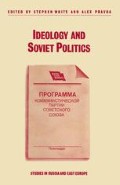Abstract
Several assumptions about ideology underpin the discussion that follows. Ideology is here viewed as one aspect of politics; and so to understand the political we must grasp the significance of ideology to it.1 This significance may vary according to historical context, political system, leadership, level of economic development, issue and situation. I do not assume that ideology is either constantly shaped by, or reducible to, external determinants, but rather that ideology interacts with other factors. Thus ideology can inspire policy, be ignored by policy, be seriously modified itself by policy or serve to qualify policy. Its impact on society is not constant over time and neither is its role necessarily homogeneous across issues.
Access this chapter
Tax calculation will be finalised at checkout
Purchases are for personal use only
Preview
Unable to display preview. Download preview PDF.
Notes
See Richard Stites, The Women’s Liberation Movement in Russia (Princeton University Press, 1978)
and Rudolf Schlesinger, The Family in the USSR ( London: Routledge, 1949 ).
Inessa F. Armand, Stat’i, rechi, pis’ma ( Moscow: Politizdat, 1975 ).
For further elaboration see Alix Holt, ‘Marxism and women’s oppression: Bolshevik theory and practice in the 1920s’, in T. Yedlin (ed.), Women in Eastern Europe and the Soviet Union ( New York: Praeger, 1980 ), p. 87.
Alexandra Kollontai, Selected Writings, trans. Alix Holt ( New York: Norton, 1977 ).
G. Shitarev, ‘O novykh formakh partiinoi raboty’, Partiinaya zhizn’, 1961, no. 11, pp. 10–11.
Vera Bil’shai, Reshenie zhenskogo voprosa v SSSR, 2nd edn ( Moscow: Gospolitizdat, 1959 ), p. 253.
Some results of this research may be found in Gail Warshofsky Lapidus, Women in Soviet Society: Equality, Development and Social Change ( Berkeley: University of California Press, 1978 ).
A focus on the relationship between female roles is offered in Mary Buckley, ‘Women in the Soviet Union’, Feminist Review, vol. 8 (summer 1981), pp. 79–106.
N. M. Shishkan, ‘Sotsial’no-ekonomicheskie problemy povysheniya effektivnosti obshchestvennogo truda zhenshchin’, candidate degree dissertation abstract, Kishinev, 1969
Shishkan, Trud zhenshchin v usloviyakh razvitogo sotsializma (Kishinev Shtiintsa, 1976)
A. E. Kotlyar and S. Ya. Turchaninova, Zanyatost’ zhenshchin v proizvodstve ( Moscow: Statistika, 1975 )
M. Ya. Sonin, ‘Ravnye prava, neravnye nagruzki’, Ekonomika i organizatsiya promyshlennogo proizvodstva, May-June 1978, pp. 5–18
Nadezhda Tatarinova, Primenenie truda zhenshchin v varodnom khozyaistve SSSR ( Moscow: Nauka, 1979 )
Z. M. Yuk, ‘Voprosy ratsional’nogo ispol’zovaniya truda v Belorusskoi SSR’, candidate degree dissertation abstract, Minsk, 1968
N. V. Panova, ‘Zhenskii trud v sotsialisticheskom proizvodstve’, candidate degree dissertation abstract, Vilnius, 1970
V. I. Kozachenko, ‘Sotsial’no-ekonomicheskie problemy ispol’zovaniya zhenskogo truda v kolkhozakh’, candidate degree dissertation abstract, Kishinev, 1969
Z. I. Eremina, ‘Problemy ispol’zovaniya zhenskogo truda v narodnom khozyaistve SSSR v sovremennykh usloviyakh’, candidate degree dissertation abstract, Saratov, 1972.
Z. V. Samokhina, ‘Puti preodoleniya ostatkov neravenstva zhenshchin i muzhchin v usloviyakh razvitogo sotsialisticheskogo obshchestva’, candidate degree dissertation abstract, Moscow, 1972.
Joel C. Moses, The Politics of Female Labor in the Soviet Union (Ithaca, NY: Cornell University, Western Societies Program Occasional Paper no. 10, 1978 ), pp. 46–8
Z. A. Volkova et al., Komissiya po rabote sredi zhenshchin pri FZMK ( Moscow: Profizdat, 1979 )
Z. A. Volkova et al., Komissiya proJkoma po voprosam truda i byta zhenshchin, okhrany materinstva i detstva ( Moscow: Profizdat, 1984 ).
Panova, ‘Zhenskii trud’, p. 18. Various views of social scientists on part-time labour for women and other topical issues may be found in Mary Buckley, Soviet Social Scientists Talking: An Official Debate about Women ( London: Macmillan, 1986 ).
Stephen Sternheimer, ‘Communication and power in Soviet urban politics’, in Everett M. Jacobs (ed.), Soviet Local Politics and Government ( London: Allen and Unwin, 1983 ), pp. 149–50.
Genia Browning, ‘Soviet politics — where are the women?’, in Barbara Holland (ed.), Soviet Sisterhood ( London: Fourth Estate Books, 1985 ), p. 221.
N. Kh. Nagiev, ‘Kommunizm i sotsial’noe ravenstvo polov’, candidate degree dissertation abstract, Baku, 1971, p. 7.
S. V. Broya, ‘Sotsial’nye problemy zhenskogo truda v promyshlennosti’, candidate degree dissertation abstract, Sverdlovsk, 1968, p. 4.
E. B. Gruzdeva, ‘Vozrastanie roli zhenshchin-rabotnits v obshchestvennom proizvodstve i sovershenstvovanie ikh byta v usloviyakh razvitogo sotsializma’, candidate degree dissertation abstract, Moscow, 1979, P. 1.
L. Rzhanitsina, Female Labour under Socialism: the Socio-Economic Aspects ( Moscow: Progress, 1983 ), p. 73.
E. E. Novikova, Zhenshchina v razvitom sotsialisticheskom obshchestve ( Moscow: Mysl’, 1985 ), pp. 9–32.
N. M. Khodakov, Molodym suprugam, 3rd edn ( Moscow: Meditsina, 1981 ), p. 99.
D. Valentei, ‘Control of demographic processes’, in Demographic Processes ( Moscow: Social Sciences Today, 1983 ), p. 15.
E. E. Novikova, T. N. Sidorova and S. Ya. Turchaninova, Sovetskie zhenshchiny i profsoyuzy ( Moscow: Profizdat, 1984 ), p. 162.
E. E. Gruzdeva and E. S. Chertikhina, Trud i byt sovetskikh zhenshchin ( Moscow: Politizdat, 1983 ), pp. 182–208.
R. I. Kosolapov et al., Developed Socialism: Theory and Practice ( Moscow: Progress, 1983 ), p. 40.
A. Nelyubin, Massovo-politicheskaya rabota po mestu zhitel’stva ( Moscow: Moskovskii rabochii, 1983 ), p. 69.
Editor information
Editors and Affiliations
Copyright information
© 1988 School of Slavonic and East European Studies, University of London
About this chapter
Cite this chapter
Buckley, M. (1988). Soviet Ideology and Female Roles. In: White, S., Pravda, A. (eds) Ideology and Soviet Politics. Studies in Russia and East Europe. Palgrave Macmillan, London. https://doi.org/10.1007/978-1-349-19335-6_8
Download citation
DOI: https://doi.org/10.1007/978-1-349-19335-6_8
Publisher Name: Palgrave Macmillan, London
Print ISBN: 978-0-333-43910-4
Online ISBN: 978-1-349-19335-6
eBook Packages: Palgrave Political & Intern. Studies CollectionPolitical Science and International Studies (R0)

